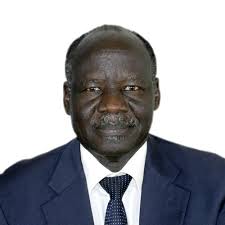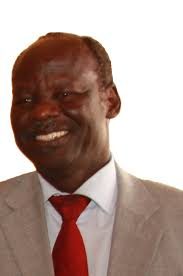Why a technocratic transitional government in South Sudan?

By Dr. Lam Akol
The youngest country in the world was born amid great expectations and hopes for the future. These were not day dreams or castles built in the air. The hope was based on the fact that the country is endowed with human and natural resources very few African countries, if any, had at independence. Today it is a basket case not because of misplaced assessment of its resources but of bad leadership. The current regime in Juba has turned its back on the slogans of liberation and turned into an ethnocentric kleptocracy that cared less about its people but only about siphoning the resources of the country to support its extensive patronage networks so as to prolong its stay in power. Therefore, it is not by accident that the country is today embroiled into an unnecessary ethnic civil war that has seen horrendous war crimes and crimes against humanity being committed by both sides of the conflict. The last and current spite of civil war was initiated by none other than the sitting President. It follows that any attempt to resolve the current crisis must never reward perpetrators of atrocious crimes nor tolerate impunity.
Classical liberal prescriptions of peace agreements, as has been the case in Sudan and South Sudan, end up with a transitional government that is entrusted to implement the provisions of the peace agreement reached by the negotiators. These provisions are usually meant to stop the war, create a conducive atmosphere for a sustainable peace through democratic transformation and reform of governance institutions and finally the conduct of a general election for the people to choose their leaders in a free, fair and credible manner. The question is: can the antagonists be trusted to carry out that mission?
The simple answer to this question is that they can’t. There are many reasons for that. Suffice it here to stress that a transitional government stitched together from the warring parties has no chance of being coherent as each side jockeys for advantages with the eyes set on the ball; that is winning the elections that will follow at the end of the Transition in two or so years. Such was the case in 2005-2011 and in 2015-2016 with disastrous consequences. This vicious circle has to be broken if South Sudan has to have a chance of stability not to mention democratic transformation. The way out is by eliminating from the power equation the politicians with vested interests in the outcome of the elections expected to take place at the end of the Transition. The Transition should be run by South Sudanese patriots who are not engaged in partisan politics but have the requisite ability to execute the tasks of the transitional government and deliver a free, fair and credible election at the end of the Transition. The politicians should wait and use the short Transition to build their political parties or Movements in preparation for the general election.
It is these South Sudanese we call technocrats. They are part of the broader civil society and should not be confused with technicians nor are they necessarily civil servants in active service. There are many of them out there. Their selection must be based on strict criteria agreed upon a priori and on that basis they shall be vetted by the stakeholders who negotiated and signed the peace agreement to be. Another condition that should be imposed on them to further ensure their undivided attention to their task at hand is not to seek elective office immediately after the Transition.
The major obstacle in agreeing on transitional governments in peace talks has always been the insistence of the sitting government that it was elected by the people and thus enjoys the legitimacy to continue ruling. In South Sudan today, the civil war itself is a damning verdict against that claimed legitimacy, for the cardinal function of a government is to safeguard its people from fear and from want. The current regime in Juba could not do either. In fact, it has been the main cause of fear with millions voting with their feet to become refugees and internally displaced. Some quarter of a million have chosen to seek protection from the atrocities of their government in the UNMISS Protection of Civilians sites in the national capital and other towns. The remaining population is at the grip of food shortage and real famine. It is only the international good will that keeps them surviving. If the people whose sovereignty the government should be exercising on their behalf are undergoing such tribulations, what moral authority has the regime to cling on to power?
For those who see things from a legalistic lens only, it sufficient to state that the current regime in Juba is de facto and not de jure. There are many reasons to support this conclusion but for the lack of space only one shall be here mentioned. It is to be recalled that since independence the South Sudanese have never elected a president nor members of Parliament. The current government derives its legitimacy only from the August 2015 Agreement for the Resolution of Conflict in the Republic of South Sudan (Agreement). This is why it is termed the Transitional Government of National Unity (TGoNU) as came in the Agreement. Since the agreement has collapsed, the legitimacy of that government goes with it and it is not renewable. A new dispensation has to be worked out in a new all-inclusive roundtable of stakeholders. It is in this context that this proposal is being made.
Sudan has seen two technocratic transitional governments in its modern history. Both came about after popular Uprisings overthrew the military juntas (in 1964 and 1985) and led the Transition to democratic elections. The Council of Ministers, which wielded executive authority, was in both cases composed of non-partisan personalities that paved the way for democratic elections. Of course, technocratic transitional governments are not without problems, but taking all factors into account they come up far on top compared with a transitional government of politicians if the purpose is to prepare a level field for all.
To recap, the main reason for proposing a technocratic transitional government in South Sudan is to put in place a team that can deliver the Transition to its intended purpose. That purpose is to prepare a level ground for all citizens for the country to leave its troubled past behind and embark on a truly democratic path.
Editor’s Note: The views expressed in the “Opinion Page” are solely the opinions of the writers. The veracity of any claims made are the responsibility of the author’s and are not necessarily endorsed by The Malakal Post. The Malakal Post, reserves the right to edit articles before publication. If you would like to submit an opinion article or analysis, please email your article at: info@malakalpost.com















